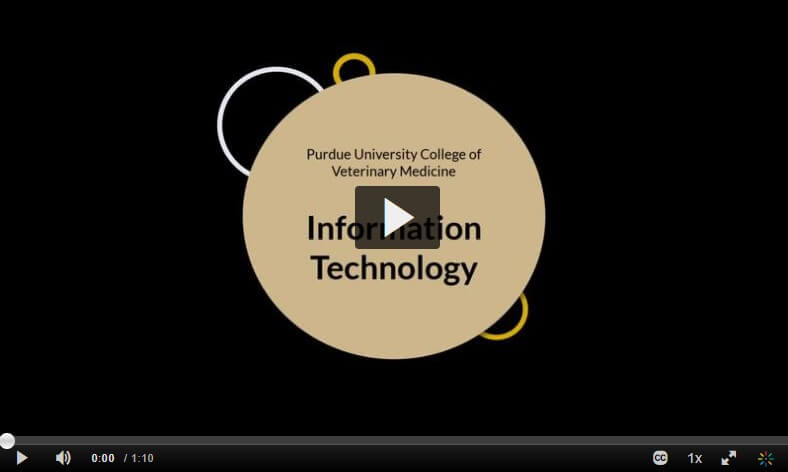
The Purdue Veterinary Medicine Information Technology department (PVMIT) is the onsite exclusive IT department for the Purdue University College of Veterinary Medicine. That responsibility proved to be challenging over the past year, after the global COVID-19 pandemic was declared last March.
PVMIT has undergone several transformations during the past 12 months. Guided by new leadership, the PVMIT team has adapted to the special needs of the college brought on by the pandemic while continuing to serve the PVM community and their day-to-day needs.
The team as a whole is made up of four sub-teams. They are led by Nancy Allrich, who joined PVMIT last year in a new leadership capacity. She provides oversight of daily and strategic IT operations and also directs and manages the application development, systems, support services, and instructional design teams. Additionally, Nancy leads PVMIT’s efforts in development and implementation of integrated technology.
In addition to having new leadership, PVMIT has adapted to the changing technology trends and demands brought about by COVID-19. The team has continued to provide support and technology expertise as many college operations have moved to a virtual environment.
Of the four sub-teams, the Support Team, led by Tony Scalone, is comprised of several individuals who are in charge of a wide variety of IT duties, including helping to fix Boilerkey issues, assisting with printing issues, installing software, video conferencing support, and more. This team services all individuals in the college, whether they are DVM students, veterinary nursing students, faculty, or staff. Additionally, the team services the needs of students who are either learning remotely or taking classes in-person. The support team also includes several system engineers who help to support the many systems and technologies used throughout the college.
Another team integral to PVMIT is the Instructional Design Team. This multifaceted group is tasked with a myriad of duties. Among those is handling the application of educational technologies, which includes creating courses and Brightspace and making sure the course web sites work properly and meet the needs of each class. Additional responsibilities include video recordings, exam support, and innovative course content creation, such as the development of online case studies. Since the COVID-19 pandemic began, there has been an increase in the demand for educational technologies and creative course strategies. To help provide the most up-to-date information, the team has put together the PVM Instructional Resources site (login required) which has many helpful documents and links to many educational tools. In addition, the team also is tasked with managing the permissions and overview training associated with the Purdue University Veterinary Hospital’s electronic medical records system.
Another vital PVMIT group is the Application Development Team led by Eric Biggs. This team is made up of the programmers and developers who create various programs and databases including the Hospital Information System (HIS), DogTraxx, and Vitals. The Application Development Team continues to manage and improve their programs while continuing to develop new and innovative resources.
The fourth PVMIT team is the Systems Team, led by Dennis Barnett. This team works behind the scenes to help manage numerous components of the college’s technology. Ranging from servers to security, the team leads efforts to integrate the many technologies in the college. The Systems Team also has played an important role in preparing for the use of smart technologies that are to be utilized in the new veterinary hospital facilities.
In addition to managing the IT needs of the college, PVMIT also supports the Animal Disease Diagnostic Laboratory, the Caesars Entertainment Equine Specialty Hospital, and the West Lafayette campus of the Indiana University School of Medicine.
Nancy and the other PVMIT leaders were instrumental in coordinating the department’s efforts during the COVID-19 pandemic. They worked to ensure the safety of their team without compromising high quality customer service, all while rising to the heightened expectations of the college.
PVMIT has put together a short video highlighting some of the different services and team members. Click here to view the video.
If you need to contact PVMIT, you can do so by sending an email to pvmit@purdue.edu, calling extension 41153, or visiting Lynn G193A. PVMIT looks forward to assisting you!
